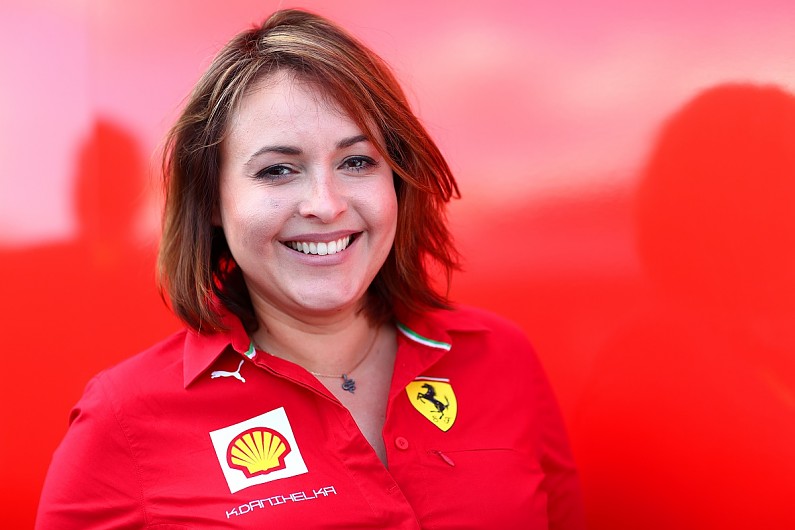We go behind the scenes at the Montreal Shell Track Lab to find out what it’s really like to be part of the team that helps to power Scuderia Ferrari
How long have you been working as part of the Shell Track Lab team?
Since last summer. I’m very proud and honoured to be part of the Shell Track Lab team, this is a great opportunity to be part of such an exciting world.
What’s your job like day to day?
This depends on whether I am in the Shell Technology Centre in Hamburg, or trackside in the lab at a grand prix race.
On site in the Track Lab, I make an important contribution providing support and analysis alongside my colleagues. (Usually there are three of us at each race) As a team we have to ensure that the oil and fuel are both fully compliant with FIA regulations, but we also feedback important information to the Scuderia Ferrari engineers on the life of the engine. Our contribution allows them to make essential decisions on whether parts need to be replaced and when. When I’m not at a race, I work back at the Shell technology centre in Hamburg as a coordinator in Formula 1. I’m responsible for the development of oil in the laboratory, and organising all of the analysis. I’m also responsible for the delivery of oils to every single grand prix – it’s a lot of organisation work.
The opportunity to join the Shell Track Lab team at races has given me the full picture of Shell’s work in Formula 1, which is the perfect match between the development and research in Hamburg and the exciting job directly at the races. Being here trackside is very emotional, very fast-paced – it’s fantastic to see the relationship between Shell Motorsport and Scuderia Ferrari in action.
How did you begin your career at Shell?
I started at Shell in 2004, in Hamburg, and I’ve worked in a lot of different areas in the lubricants sector, getting to know a lot about the oil product families. I was always interested in sports cars, so I started studying Chemical Process Engineering to go deeper into the technical field. Due to my long-standing knowledge of lubricants, I was supported by Shell management to become a coordinator and then in 2018 I became an F1 coordinator, which is great. I never thought that dream would come true.
What did you think the first time you came to the Shell Track Lab?
The first thing is the emotion; you have to be passionate to do this job. Watching the races on TV is totally different – when you are at the circuit you feel the heightened emotions of the drivers, the teams and the fans. To know that your work is directly helping your team, our team [Scuderia Ferrari] to reach its goal is very special.
What’s the most difficult part of your job?
The most difficult part is that you have to deliver a huge amount of data in a short space of time, sometimes it can be a very demanding place to work. You have to be able to handle the pressure and have a solution for every problem and remain calm. Also, the days can be very long, you have to travel a lot – but if you are passionate and you love your job it’s always worth it.
What’s the best bit?
The best bit is when the team you are supporting wins a race. That’s really special.
What’s been the highlight of your career so far?
The highlight has definitely been getting the opportunity to join the team here at the Track Lab and come to the races.

How unusual is the partnership between Shell and Scuderia Ferrari?
It’s the oldest partnership in motorsport, and one of the most successful with Shell fuels and lubricants having powered Scuderia Ferrari to ten FIA Formula One™ Constructors’ titles and twelve Drivers’ Championship wins. As part of the partnership, Shell invests more than 21,000 man hours a year its Formula One™ programme to give Scuderia Ferrari the competitive edge on the track. The fact that both companies support each other, is what makes it so unique.
What’s the ratio of men to women in your job?
In general, I would say in the laboratories in Hamburg there are more women – perhaps 60%/40%? At the racetrack, at least in the technical part, there are only about 10% female members. But this is something Shell has the awareness of, and they are encouraging women into these kind of roles, helping them to develop their careers. I felt incredibly welcome at the track. From the first moment, I was deeply involved in every process here, everyone treated me with respect and in the end, if you are passionate and everyone has the same vision, your gender doesn’t matter.
What advice would you give someone who wanted to do your job?
If you can handle the pressure and you have a real passion for motorsport, I would advise getting some technical or chemistry qualifications. Communication skills are also important, there are always media panels and interactions you need to be able to handle. Being passionate and focused about something is always the best way to reach your goals.
